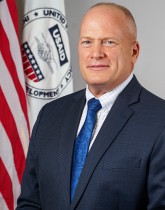- Who We Are
- Mission, Vision and Values
- Organization
- Leadership
- Office of the Administrator
- USAID at 60
- Bureaus
- Africa
- Asia
- Europe and Eurasia
- Latin America and the Caribbean
- Middle East
- Bureau for Development, Democracy, and Innovation (DDI)
- Bureau for Resilience and Food Security
- Global Health
- Legislative and Public Affairs
- Management
- Policy, Planning and Learning
- Foreign Assistance
- Bureau for Conflict Prevention and Stabilization
- Bureau for Humanitarian Assistance (BHA)
- Center of Excellence on Democracy, Human Rights and Governance
- Office Of Economic Policy
- Office of American Schools and Hospitals Abroad
- Office of Education
- Office of Energy & Infrastructure
- Office of Food for Peace
- Office of Forestry and Biodiversity
- Office of Gender Equality & Women’s Empowerment
- Office of Global Climate Change
- Office of Land and Urban
- Office of Local Sustainability
- Office of Private Capital and Microenterprise
- Office of Program, Policy, and Management
- Office of Trade & Regulatory Reform
- Office of U.S. Foreign Disaster Assistance
- Office of Water
- Independent Offices
- Mission Directory
- Advisory Committee
- Board for International Food and Agricultural Development
- Mission Directors
- Coordinators
- USAID History
- Operational Policy (ADS)
- Transparency
- Resource Portal
- The Journey to Self-Reliance
Speeches Shim
USAID operates 15 bilateral missions in Asia: Afghanistan, Bangladesh, Burma, Cambodia, India, Indonesia, Kyrgyz Republic, Nepal, Pakistan, Philippines, Sri Lanka, Tajikistan, Timor-Leste, Uzbekistan, and Vietnam. USAID also operates three regional missions in Asia: the Regional Development Mission for Asia in Thailand, which manages regional programming and development programs in countries without missions; the Pacific Islands Regional Office based in the Philippines, which covers 12 countries in the Pacific; and the Central Asia Regional office based in Kazakhstan, which oversees development programs in Kazakhstan, Turkmenistan, and across the region.
In Washington, D.C., the Bureau for Asia has the following offices that support the missions:
- The Office of the Assistant Administrator (ASIA/AA) directs and supervises the activities of the Bureau and its overseas organizations. ASIA/AA formulates, approves, and authorizes U.S. development assistance programs and projects; presents the Asia Bureau’s program and budget to Congress; and approves and directs the allocation of resources among Asia Offices and Missions.
- The Office of Technical Services (ASIA/TS) supports the Asia Bureau, regional platforms, and field missions with technical staff focused on the unique transformational development issues confronting the Asia region. ASIA/TS provides the Bureau with technical advice for country strategic and operational planning. Region-specific service would come through analytical and program assistance, and virtual and temporary-duty support. ASIA/TS divisions encompass—and interconnect—the health, education, democracy/governance, economic growth, energy, environment, infrastructure, and peace/security sectors. ASIA/TS is the coordinating Office for Private Sector Engagement (PSE) within the Asia region.
- The Program Office (ASIA/PO) is the Bureau’s principle interlocutor for foreign assistance policy, strategic planning, budgeting and coordination with the State Department’s related Regional Bureaus, the Office of U.S. Foreign Assistance Resources (State/F) and the Office of the Assistance Coordinator to Europe and Eurasia (EUR/ACE), as well as Congressional and external outreach via the Bureau for Legislative and Public Affairs (LPA) and the Office of the General Counsel (GC). ASIA/PO supports all USAID overseas Operating Units in Asia by providing policy guidance and leading strategic planning through the Country Development Cooperation Strategy process, budget formulation and execution, and oversight and accountability for programs, audits and communications.
- The Office of Administrative and Management Services (ASIA/AMS) provides support on organizational structure, administrative processes and resources. ASIA/AMS handles Bureau and overseas Mission management activities such as personnel assignments, workforce analytics and organizational supervision. Consistent with Agency-wide policies, ASIA/AMS recommends and implements internal policies on personnel actions; performance-management; incentive and performance awards; planning for, and the allocation of property and space; travel; and security and emergency preparation. ASIA/AMS manages all actions with regard to the execution of the region’s Operating Expense (OE) budget, and provides technical guidance and assistance on administrative/budgetary matters as they relate to OE and personnel/human resources.
- The Office of East Asian and Pacific Affairs (ASIA/EAP) supports bilateral and regional activities in Burma, Cambodia, China (including Tibet), Indonesia, Laos, Mongolia, Pacific Islands, Philippines, Timor-Leste, Vietnam, and the Regional Development Mission for Asia in Thailand. ASIA/EAP provides policy coordination in the interagency for country and regional programs including assistance related to the Association of Southeast Asian Nations (ASEAN), the Asia-Pacific Economic Cooperation Forum (APEC) and the Lower Mekong Initiative. In addition, ASIA/EAP serves as the Agency point of contact for North Korea and Taiwan and as the interface for bilateral and multilateral donor programs in all of the above countries.
-
The Office of South and Central Asian Affairs (ASIA/SCA) supports bilateral and regional activities in the South Asian countries of Bangladesh, India, Maldives, Nepal, Sri Lanka, and the Central Asian countries of Kazakhstan, Kyrgyzstan, Tajikistan, Turkmenistan, and Uzbekistan. ASIA/SCA serves as the interface for bilateral and multilateral donor programs in all of the above countries. For Central Asia, ASIA/SCA coordinates bilateral and regional programs with State/F and EUR/ACE on foreign assistance strategies, programming and budgets.
-
The Office of Afghanistan Affairs (ASIA/AF) supports and coordinates bilateral and regional activities in Afghanistan. ASIA/AF serves as the interface for bilateral and multilateral donor programs in Afghanistan, and other agencies of the US.Government, while also assisting with other technical and programmatic functions. ASIA/AF provides extensive support to the USAID/Afghanistan Mission in Kabul with technical, monitoring & evaluation and programmatic issues as well as counter-terrorism vetting operations.
-
The Office of Pakistan Affairs (ASIA/PAK) supports and coordinates the bilateral and regional activities in Pakistan. ASIA/PAK serves as the interface for bilateral and multilateral donor programs in Pakistan. ASIA/PAK also coordinates with other offices on strategy/policy, personnel/budgeting, analyses and monitoring, and external relations. ASIA/PAK facilitates temporary duty assignments in support of USAID/Pakistan’s operations and programs, and supports counter-terrorism vetting operations.




Comment
Make a general inquiry or suggest an improvement.